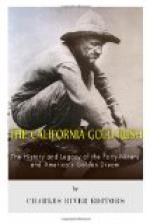But with the sight of shore, the low beach, and the round high bluffs with the castle atop that meant Chagres, this comradeship rather fell apart. Soon a landing was to be made and transportation across the Isthmus had to be obtained. Men at once became rivals for prompt service. Here, for the first time, the owners of the weird mining-machines already described found themselves at a disadvantage, while those who carried merely the pick, shovel, and small personal equipment were enabled to make a flying start. On the beach there was invariably an immense wrangle over the hiring of boats to go up the river. These were a sort of dug-out with small decks in the bow and in the stern, and with low roofs of palmetto leaves amidships. The fare to Cruces was about fifteen dollars a man. Nobody was in a hurry but the Americans.
Chagres was a collection of cane huts on level ground, with a swamp at the back. Men and women clad in a single cotton garment lay about smoking cigars. Naked and pot-bellied children played in the mud. On the threshold of the doors, in the huts, fish, bullock heads, hides, and carrion were strewn, all in a state of decomposition, while in the rear was the jungle and a lake of stagnant water with a delicate bordering of greasy blue mud. There was but one hotel, called the Crescent City, which boasted of no floor and no food. The newcomers who were unsupplied with provisions had to eat what they could pick up. Unlearned as yet in tropical ways, they wasted a tremendous lot of nervous energy in trying to get the natives started. The natives, calm in the consciousness that there was plenty of demand, refused to be hurried. Many of the travelers, thinking that they had closed a bargain, returned from sightseeing only to find their boat had disappeared. The only safe way was to sit in the canoe until it actually started.
With luck they got off late in the afternoon, and made ten or twelve miles to Gatun. The journey up the lazy tropical river was exciting and interesting. The boatmen sang, the tropic forests came down to the banks with their lilies, shrubs, mangoes, cocos, sycamores, palms; their crimson, purple, and yellow blossoms; their bananas with torn leaves; their butterflies and paroquets; their streamers and vines and scarlet flowers. It was like a vision of fairyland.




